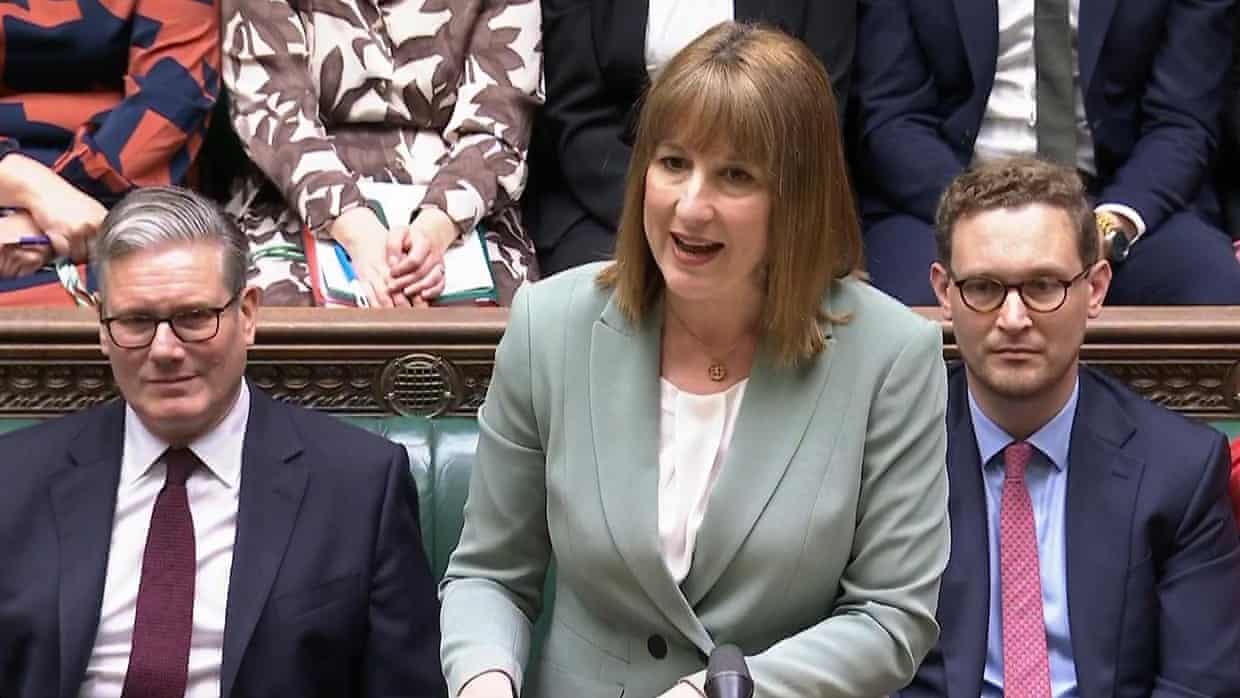Reeves refuses to say she will stick to manifesto pledge on tax rises and insists she must face world ‘as it is’ – as it happened
It is probably now all but certain that Rachel Reeves will break Labour’s manifesto promises and put up income tax in the budget.That is where the commentariat consensus is, five hours after the chancellor’s speech this morning.That is not something we can report yet as fact.But the hints in the speech this morning went beyond “the clearest sign yet (that income tax will rise)”, to use one of the essential cliches of political journalism.There is a category of information where something isn’t quite a fact, but it is so widely assumed to be right that it might just as well be.
With her speech this morning Reeves landed the ‘broken manifesto promise’ assumption into this space.If/when it happens on 26 November, we will think we knew that already.Heather Stewart in the Guardian says the chancellor was signalling that she is willing to break Labour’s manifesto promises on tax.Though she didn’t quite say it explicitly, the combination of weaker economic forecasts from the OBR, and her refusal to make Osborne-style cuts, either in investment or day-to-day spending, points to tax rises in the budget on 26 November.And she left the door wide open to making those rises in a way that hits more than just those with the “broadest shoulders” – who were noticeably absent from the speech.
“If we are to build the future of Britain together, we will all have to contribute to that effort,” she said.“Each of us must do our bit for the security of our country and the brightness of its future.”As well as a hint to voters of what is to come – and why – that was meant as a signal to markets that she is prepared to take drastic action, even as far as breaking Labour’s promises, if that is what it takes to stick to her “iron clad” spending rules.Sam Fleming and George Parker in the Financial Times say that the speech made it clear that Reeves is “on the cusp” of breaking the Labour manfesto promises on tax.They also say she is partly at fault.
In a speech shot through with attacks on the last government, Reeves decried politicians resorting to “short-term sticking plaster solutions, rather than making long-term economic plans”.She could easily be blamed for similar sins.Labour came into office claiming that higher growth could fix the deep problems in the public finances and help fund improved public services, a claim that few economists believed was sustainable.Reeves’ first Budget last October was the biggest tax-raising fiscal event in a generation.Yet she left herself only paper-thin fiscal buffers, leaving the Treasury badly exposed to increases in global interest rates.
Jessica Elgot from the Guardian says it was not hard to decode what Reeves was saying.Rachel Reeves’ answer to @pippacrerar.bsky.social [see 9.21am] makes it crystal clear that Reeves is headed towards breaking a manifesto pledge on tax and how she will frame it - as a necessary response to “the world as it is” when the alternative would be more cuts or borrowing.
Lots of commentary saying that it’s not clear what the point of the speech is.Seems pretty clear to me.It’s pitchrolling broad based tax rises in the Budget and making sure - as Reeves did with the fiscal rule change in 2024 - that it doesn’t surprise the markets on the day.Reeves says that she will deal with “the world as it is”, talks about productivity downgrade, rejects further spending cuts and borrowing and says “everyone must contribute” - this is not exactly the Enigma code.George Eaton at the New Statesman says Reeves thinks voters will understand why she is breaking a manifesto promise.
[Reeves’s] defining political judgment is this: that voters are prepared to pay higher taxes for better public services.Polling by Persuasion UK, revealed by my colleague Anoosh Chakelian and studied by the Treasury, shows the public prioritises reduced NHS waiting lists far above Labour’s tax pledges.Reeves today, like Gordon Brown before her in 2002, tied higher taxes to protecting Britain’s “national religion” …Reeves’s great gamble is that she can yet restore their faith by proving that crumbling public services and economic stagnation are not inevitable.But the risks are considerable: Reform will cry that her tax rises prove that no Labour politician can be trusted; the Tories will charge her with chronic economic mismanagement; the Greens and Lib Dems will ask why she isn’t doing more to tax wealth.Ben Riley-Smith from the Telegraph says Reeves wants people to understand why the manifesto will be broken.
The takeaway is simple: The Treasury wants the message communicated publicly and loudly that they are considering ripping up manifesto promises on tax.If this really is a bait and switch - raising the prospect of a breach only to surprise everyone by not doing it at the Budget - it is being adopted with gusto.The simpler theoretical explanation: The manifesto will be broken and the Chancellor is communicating now, well in advance, the argument for why so it beds in.Chris Mason from the BBC says Reeves was explaining the context for her budget decisions.Reeves volunteering to commandeer the broadcasting apparatus of Downing Street – the specially built news conference room in No 9 – tells you everything about the scale of what she is toying with at the end of the month.
Well, I say everything, not quite,The actual choices, the decisions, including which taxes will go up and by how much, will come at the end of the month,What we got this morning was the argument, the case for what she will do,One senior figure said to me, think of the news conference as being like the first five pages of the chancellor’s speech on Budget Day, in which she sketches out the economic landscape as she sees it before she announces what she is going to do,Jason Groves from the Mail thinks the speech will only trigger more speculation.
Curious speech from Rachel Reeves.It was billed as an attempt to dampen ‘speculation’ about the Budget, but by confirming taxes will rise without indicating where the pain will hit it looks likely to trigger… more speculationJonn Rentoul at the Independent thinks Reeves has not cut spending enough to justify breaking the manifesto.When it came to the central point, it was addressed in a sentence and a half: “To protect public services from a return to austerity, we will all have to contribute to that effort – each of us must do our bit.”Thus, she whisked evasively over the only question that matters.People might accept tax rises if they are seen as fair – and part of that fairness means that they have to be accompanied by spending cuts.
Without spending cuts, it looks as if she is failing to do everything she can to protect people from the tough decisions.In tough times, it makes sense for government to make do with less.People might even accept that, if they want decent public services, they have to pay for them.But everyone knows that the disability benefits budget is rising unjustifiably, and that Reeves’s blunt attempt to restrain its growth was thrown out by Labour MPs.An honest chancellor would take that problem head-on and ask Labour MPs to think again before going to the taxpayer for a bailout.
Will Hutton from the Observer says income tax will have to rise.Some takeaways implicit in the Reeves speech.The deal with the US to raise NHS drug prices is material - £3-4 bnFiscal headroom is going up - expect £20bnThe OBR productivity downgrade is material too - £17.5bnFuel duty frozen +vat off energy- £5bnIncome tax rise a mustThe Chancellor could not say so, but she confronts a £40 bn challenge.NHS/US drug deal, welfare spending, cost of living package, doubled fiscal headroom , productivity downgrade.
Yes, income tax must rise..but perhaps a strategic root and branch review of property taxes?Kevin Maguire, the Daily Mirror columnist, thinks the government is about to make a bit misake.Listening to that Reeves speech I wonder if the UK Government has a death wish.Rachel Reeves has refused to rule out tax rises in this month’s budget, insisting she must “deal with the world as I find it, not the world as I might wish it to be”.
Here is Heather Stewart’s analysis of the chancellor’s speech.After the speech gilt prices rose, pushing down the yield (or interest rate) on UK debt, as Graeme Wearden reports in his business live blog.Bridget Phillipson has urged the equalities watchdog to focus more on helping ministers do their jobs and less on having public debates as a row continues about how long it will take to implement new rules on gender recognition.Caroline Dinenage, the Tory MP who chairs the Commons media committee, has written to the chair of the BBC saying she is “extremely worried” about a report claiming that the corporation selectively editing a Donald Trump speech to overstate the extent to which he was supporting an attack on the US Capitol.The Tory leader Kemi Badenoch said that “heads should roll” at the BBC over the incident.
(See 3.21pm.)Sir Alan Bates has agreed a multimillion-pound settlement with the government more than two decades after he began the campaign for justice for post office operators over the Horizon IT scandal.Haroon Siddique is the Guardian’s legal affairs correspondent.The civil liberties group Liberty has warned that a proposed expansion of anti-protest powers is a blow to the right to protest and worse than anticipated.
As trailed by the home secretary, Shabana Mahmood, last month after the fatal terror attack on a Manchester synagogue, the government has now tabled an amendment to the crime and policing bill introducing restrictions on repeat protests.The amendment says that when considering whether to restrict a protest a senior police officer “must” take into account any cumulative disruption caused by past protests – regardless as to whether they were organised or attended by the same people.Earlier this year, Liberty defeated very similar regulations introduced by then home secretary Suella Braverman under the Conservative government, when the court of appeal upheld a legal challenge against anti-protest laws which stated, among other things, that officers “may” take into account relevant cumulative disruption.Ruth Ehrlich, Liberty head of policy and campaigns, said:The government’s plans to restrict repeat protests go even further than we had feared, and combined with other anti-protest measures in the pipeline like bans on face coverings, will see the right to protest in the UK stripped to the bone.Liberty defeated very similar restrictions to this in the courts earlier this year.
The fact the government has reintroduced them but with even further reach is a serious blow to people’s fundamental rights.Police already have extensive powers to restrict protests, yet these measures add to an ever-expanding web of anti-protest laws.It is becoming harder and harder for people to exercise their democratic right to protest without falling foul of the law.Instead of introducing new restrictions, the government should focus on why existing laws are supposedly failing and ensure people’s rights to demonstrate are protected.YouGov has released some polling that looks at six possible tax options for the budget and asks whether or not people would view them as a breach of Labour’s manifesto promises.
Given that Rachel Reeves this morning signalled that she will ignore the manifesto (see 1.08pm), the polling may be a bit out of date, because it seems to be premised on the notion that Reeves might opt for partial tax rise that she could present as being technically consistent with the manifesto.In its manifesto, Labour said:Labour will not increase taxes on working people, which is why we will not increase national insurance, the basic, higher, or additional rates of income tax, or VAT.In some respects the polling is good news for Reeeves; it suggests that more than 30% of people do not realise that putting up the basic rate of income tax would be a manifesto breach.As the media devotes more coverage to this issue ahead of the budget, the numbers of people who either don’t know this would be a manifesto breach (27%) or think it wouldn’t be (4%) are likely to go down.
One option apparently being considered by the Treasury is a Resolution Foundation proposal that would involve the basic rate of income tax rising by 2p in the pound, offset by employee national insurance being cut by 2p in the pound.(See 10.22am.) You could argue that this would be in keeping with the manifesto, because “working people” would generally not lose out.But 36% of people would see this as a broken manifesto promise, and only 16% of them would not, YouGov found.
Reeves is expected to freeze personal tax thresholds again in the budget,This results in people having to pay more income tax but many policy experts would not regard that as a breach of the manifesto because they interpret the pledge as applying to the rate of income tax, national insurance and VAT – not the overall take,However, according to the poll, the public disagree with the experts,Some 30% of people said freezing the higher rate threshold would be a broken manifesto promise, and only 26% said it wouldn’t be a manifesto breach,Haroon Siddique is the Guardian’s legal affairs correspondent.
More than 100 lawyers have written to the justice secretary warning that adopting the recommendations of a government-commissioned report which could lead to thousands of defendants in England and Wales losing the right to a jury trial would be an “irremediable error”David Lammy is currently considering proposals by Sir Brian Leveson, the former judge asked by the government to come up with ways to tackle a record courts backlog, which would remove the right to a jury trial for offences such as sexual assault, racially or religiously aggravated strangulation, harassment and child abduction.The letter, whose signatories include 23 king’s counsel, expresses “deep concern” and urges Lammy to reject the recommendations.It claims they would not reduce the backlog, adding:Judge alone trials would be an irremediable error both for the longest standing fair trial right in this country for any proposed benefit to the system.The simplest solution is more court sitting days in existing courts, and judges and lawyers to staff them.Leveson’s recommendations, contained in a 378-page report published in July, included:-The creation of a new division of the crown court in which a judge and two magistrates hear “either way” offences – those in which the defendant can currently choose to be heard by either a magistrate or a jury in the crown court.
-Removing the right to be tried in the crown court for offences that carry a maximum sentence of no more than two years.-Reclassifying some either way offences so they can be tried only in a magistrates court.-Trial by judge alone for serious and complex fraud cases.The BBC has been accused of selectively editing a Donald Trump speech to make it appear clearer that he encouraged the US Capitol attack, according to a former external adviser to the corporation.Michael Savage has the story.
In the Q&A after her speech this morning, Kemi Badenoch was asked about the story, but declined to comment because she had not seen it.But, by the time she gave an interview to GB News, she was fully informed, and she let rip, saying “heads should roll” at the BBC.She told the channel”It’s absolutely shocking.That is fake news, actually putting different things together to try and make something look different from what it actually was.I do think heads should roll.
Whoever it was who did that should be sacked.That’s what Tim Davie should be doing, identifying who put out misinformation and sacking them.The public needs to be able to trust our public broadcaster.Everyone who’s watching the BBC, everyone with a TV, is paying a licence.We are paying their money












